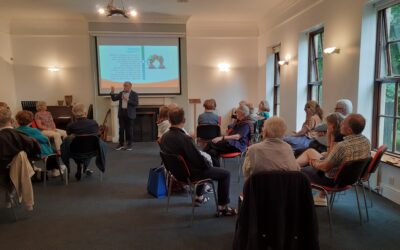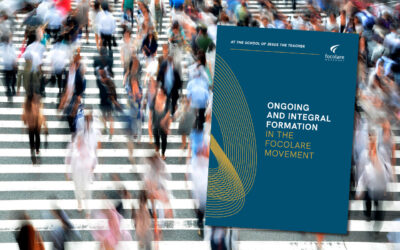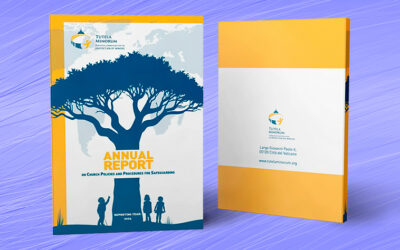 The General Statutes of the Movement calls for a three-day retreat preceeding the elections of the President, Co-President and General Council members, so that the electors united in the name of Jesus […] might be more docile to the graces of the Holy Spirit in deciding what is best for the Work of Mary. That is quite a challenge considering the great variety of Assembly members: focolarini, families, young people, priests and religious. Several bishops are also invited to represent the Bishop Friends of the Focolare. There is also a sizeable representation of members from other Christian Churches. Metta, a Buddhist, and Racim, a Muslim, will represent the faithful of other religions. A group of people with no religious affiliation who arrived a few days ago, represent the universal reach of the charism of unity.
The General Statutes of the Movement calls for a three-day retreat preceeding the elections of the President, Co-President and General Council members, so that the electors united in the name of Jesus […] might be more docile to the graces of the Holy Spirit in deciding what is best for the Work of Mary. That is quite a challenge considering the great variety of Assembly members: focolarini, families, young people, priests and religious. Several bishops are also invited to represent the Bishop Friends of the Focolare. There is also a sizeable representation of members from other Christian Churches. Metta, a Buddhist, and Racim, a Muslim, will represent the faithful of other religions. A group of people with no religious affiliation who arrived a few days ago, represent the universal reach of the charism of unity.  The three-day retreat was deemed necessary by many, so that the choices to be made might be the result of a collective discernment. During the retreat one point of Focolare spirituality was presented: “The Eucharist Mystery of Communion” which will be offered this year for reflection by all the members of the Focolare. It is potentially an awkward point considering the ecumenical and interreligious membership of the Movement, yet it has already become a topic of deep and positive dialogue and discussion among all. The presentation of the theme was preceeded by a reading of the High Priestly Prayer (Jn 17) by a group of men and women focolarini from several different Churches. Some of them then offered their thoughts. Heike, a Lutheran explained: “For Luther, the Eucharist was a mystery, so the title already puts me at ease. Something still remains that divides us, but I believe there is still more than 90% that we can live together.” Cathy, an Anglican, admitted: “Not being able to share at the same table gives me the opportunity to recognise and accept the suffering of division, and so to love more.” Metta, a Buddhist from Thailand, feels like a member of the Focolare family. “How can I live this point of the spirituality?” he asked himself. I realised that I have to purify myself every day, to be nothingness in order to be able to welcome my brothers and sisters.” Algerian Muslim, Racim, recounted how Chiara’s words on the Eucharist remind her of one Hadit of the Prophet in which it is said that God enters into the heart and into the body of every person.
The three-day retreat was deemed necessary by many, so that the choices to be made might be the result of a collective discernment. During the retreat one point of Focolare spirituality was presented: “The Eucharist Mystery of Communion” which will be offered this year for reflection by all the members of the Focolare. It is potentially an awkward point considering the ecumenical and interreligious membership of the Movement, yet it has already become a topic of deep and positive dialogue and discussion among all. The presentation of the theme was preceeded by a reading of the High Priestly Prayer (Jn 17) by a group of men and women focolarini from several different Churches. Some of them then offered their thoughts. Heike, a Lutheran explained: “For Luther, the Eucharist was a mystery, so the title already puts me at ease. Something still remains that divides us, but I believe there is still more than 90% that we can live together.” Cathy, an Anglican, admitted: “Not being able to share at the same table gives me the opportunity to recognise and accept the suffering of division, and so to love more.” Metta, a Buddhist from Thailand, feels like a member of the Focolare family. “How can I live this point of the spirituality?” he asked himself. I realised that I have to purify myself every day, to be nothingness in order to be able to welcome my brothers and sisters.” Algerian Muslim, Racim, recounted how Chiara’s words on the Eucharist remind her of one Hadit of the Prophet in which it is said that God enters into the heart and into the body of every person.  Present and future challenges will be discussed in over thirty work groups, comprised of people from around the world of every age and calling. There will also be other opportunities for participation and dialogue during the plenary sessions where stories, testimonies and the daily challenges from different national and cultural contexts will be discussed. Jean Paul from Burundy, studies in Algeria. He shared about the daily challenge of living in a Christian minority in a land that is 90% Muslim. He also expressed his satisfaction for the recognition given to young people who are taking part in the Assembly.
Present and future challenges will be discussed in over thirty work groups, comprised of people from around the world of every age and calling. There will also be other opportunities for participation and dialogue during the plenary sessions where stories, testimonies and the daily challenges from different national and cultural contexts will be discussed. Jean Paul from Burundy, studies in Algeria. He shared about the daily challenge of living in a Christian minority in a land that is 90% Muslim. He also expressed his satisfaction for the recognition given to young people who are taking part in the Assembly.  One important moment of the first week was the Presidency’s report. Maria Voce and Giancarlo Faletti presented a recap of the path of the Movement from 2008 to the present. Many things were mentioned ranging from the impact and spreading of Chiara Lubich’s thought in many fields to the official request to the Catholic Church for the opening of her process of Beatification; the distribution of Focolare members by geographic region; the sufferings, which echo the evils of society; dialogue with other Churches, religions and cultures; the youth; prospects for the six years that lie ahead, which will be examined by the Assembly. One plenary session was dedicated to a facilitated discussion by the Abba School Centre for Studies, on the current cultural landscape. They talked about the globalisation of technnology and the environment, human relations, the question of God – all issues that were offered in the more than 3,000 suggestions from Focolare members from around the world. Many members of the Assembly responded: Eddie, from Hong Kong spoke about the search for ways to bring God to the East, highlighting the necessity of concrete facts from daily living. This week the work groups will continue their discussions on cultural challenges and openness to society, catechesis, the life of local Focolare communities in diverse cultural contexts, families and the new generations, interreligious dialogue, dialogue with the modern culture, relations with the Catholic Church and other Churches. This week the President and Co-President will be elected.
One important moment of the first week was the Presidency’s report. Maria Voce and Giancarlo Faletti presented a recap of the path of the Movement from 2008 to the present. Many things were mentioned ranging from the impact and spreading of Chiara Lubich’s thought in many fields to the official request to the Catholic Church for the opening of her process of Beatification; the distribution of Focolare members by geographic region; the sufferings, which echo the evils of society; dialogue with other Churches, religions and cultures; the youth; prospects for the six years that lie ahead, which will be examined by the Assembly. One plenary session was dedicated to a facilitated discussion by the Abba School Centre for Studies, on the current cultural landscape. They talked about the globalisation of technnology and the environment, human relations, the question of God – all issues that were offered in the more than 3,000 suggestions from Focolare members from around the world. Many members of the Assembly responded: Eddie, from Hong Kong spoke about the search for ways to bring God to the East, highlighting the necessity of concrete facts from daily living. This week the work groups will continue their discussions on cultural challenges and openness to society, catechesis, the life of local Focolare communities in diverse cultural contexts, families and the new generations, interreligious dialogue, dialogue with the modern culture, relations with the Catholic Church and other Churches. This week the President and Co-President will be elected.
Focus on the essentials
Focus on the essentials




0 Comments